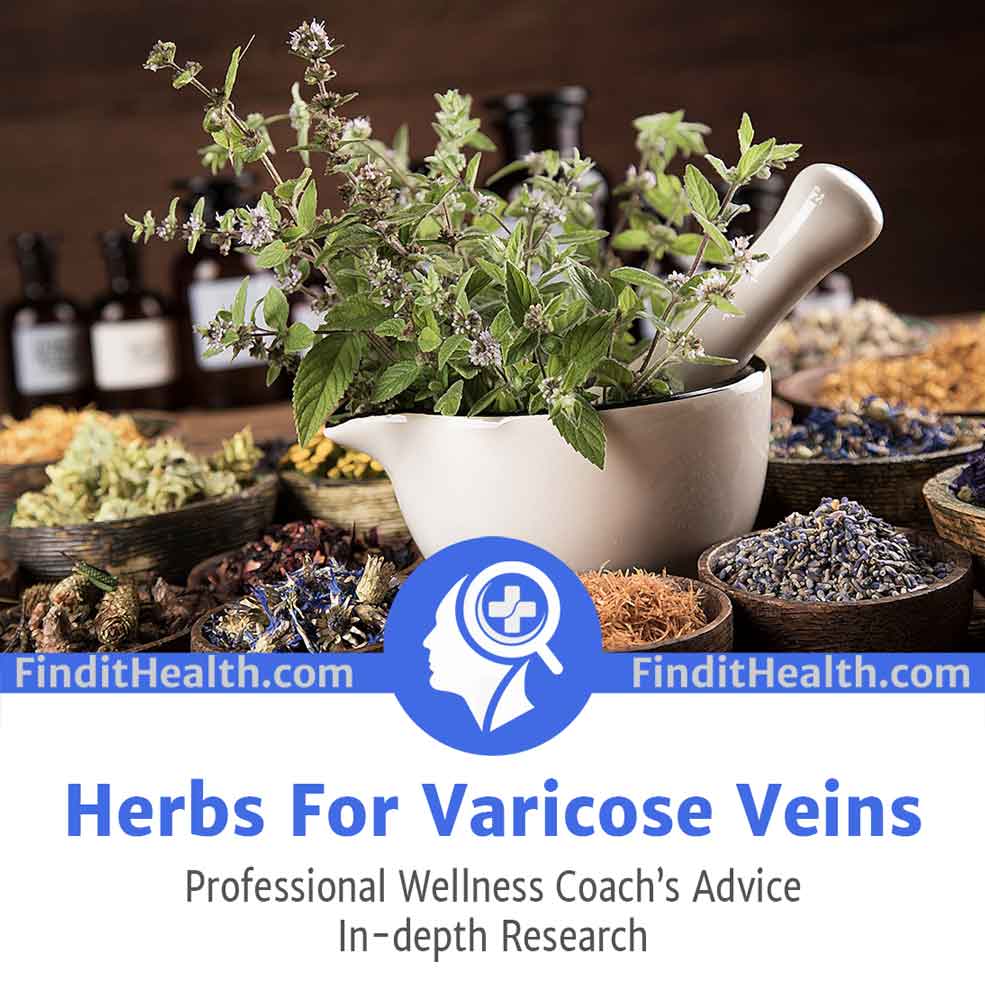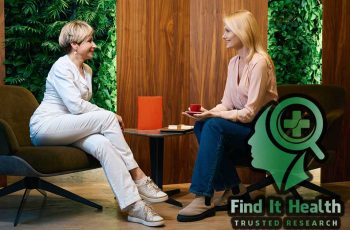
As head of the wellness coach team at Find It Health, I understand the pressing concerns surrounding varicose veins. Backed by research-based data and in-depth studies, our team dives deep into the world of natural remedies to address the challenges posed by this condition.
According to a study published by Parihar, et al., (2022). A Brief Review on Herbs Used in the Treatment of Varicose Veins. Certain herbs have played a significant role in the treatment of varicose veins.
Throughout this article, we’ll focus on the potential of certain herbs in alleviating the symptoms of varicose veins, providing you with comprehensive insights rooted in our extensive research.
Best Herbs For Varicose Veins
- Grape Seed Extract: Topping our list is the grape seed extract. Rich in antioxidants, this herbal remedy has been shown to strengthen the vein walls. Clinical studies suggest that regular consumption of grape seed extract can enhance blood flow, reduce swelling, and alleviate symptoms associated with varicose veins. Not only does it target the veins directly, but its positive impact on blood pressure further assists in managing the condition.
- Witch Hazel: This is another potent herbal remedy. Witch Hazel is an astringent when applied topically, reducing the swelling and pain associated with varicose veins. Its anti-inflammatory properties soothe the inflamed veins, offering relief from itching and discomfort.
- Butcher’s Broom: Native to the Mediterranean, this herb is known to constrict and tighten veins, which can be beneficial in treating varicose veins. It improves blood flow, ensuring veins function optimally, and reducing blood pooling.
- Gotu Kola: Widely used in traditional medicine, Gotu Kola can improve blood flow, making it effective for treating varicose veins. Moreover, it enhances the elasticity and strength of the veins, preventing them from expanding or twisting.
- Bilberry: Known for its vascular benefits, Bilberry is rich in compounds that promote the health of veins. Consumed either as an herbal extract or tea, it can help in toning the veins and reducing the symptoms of varicose veins.
Additional Tips:
- Maintaining optimal blood pressure is crucial when managing varicose veins. High blood pressure can exacerbate the condition, making herbal remedies less effective. Regular monitoring and managing your blood pressure, therefore, becomes essential.
- Before beginning any herbal regimen, it’s always wise to consult with a healthcare provider. While herbal remedies offer numerous benefits, they can interact with medications or conditions, making professional guidance necessary.
- Along with using herbal extracts and remedies, consider incorporating practices that promote good vein health. This includes low-impact exercises, elevating the legs, and avoiding prolonged standing.
SUBSCRIBE for FREE STRESS MANAGEMENT TECHNIQUES from our EXPERT COACHES!
Effectiveness
Natural Treatments and Their Effectiveness:
- Horse Chestnut Extract: Renowned for its vascular benefits, Horse Chestnut Extract is one of the premier natural treatments for vein-related issues. It contains a compound called aescin, which has been shown to strengthen vein walls, making them less susceptible to swelling. Regular use of this extract can enhance blood circulation, preventing the development of swollen veins and reducing the appearance of spider veins.
- Citrus Fruits: Rich in bioflavonoids, citrus fruits like oranges, lemons, and grapefruits play a pivotal role in maintaining the health of blood vessels. Bioflavonoids strengthen the vascular walls, ensuring they remain elastic and robust. This not only promotes optimal blood circulation but also reduces the risk of spider veins and swollen veins. Consuming citrus fruits regularly can be an effective preventive strategy.
- Witch Hazel: This natural astringent has been used for generations to treat various skin conditions. When it comes to vascular health, applying witch hazel can reduce the swelling of veins and improve blood circulation. Its anti-inflammatory properties also soothe irritated blood vessels, reducing the appearance of spider veins.
Measuring Effectiveness:
While these natural treatments offer promising results, it’s crucial to approach them with realistic expectations. The effectiveness of a remedy can vary based on factors like the severity of the condition, individual body responses, and consistency of use.
SUBSCRIBE for FREE STRESS MANAGEMENT TECHNIQUES from our EXPERT COACHES!
Symptoms Of Varicose Veins
By being aware of the symptoms, one can take prompt action, ensuring timely management and care.
Let’s get right into what these symptoms are and why they occur.
1. Visible, Enlarged Veins:
The most apparent sign of varicose veins is the visibility of bluish-purple or red veins, predominantly on the legs. They might appear twisted and bulging, often resembling cords on the surface of the skin.
2. Swelling in the Lower Legs:
One may notice a gradual swelling, especially around the ankles. This swelling is due to stagnant blood flow, causing fluid to accumulate in the surrounding tissue.
3. A Heavy or Aching Sensation:
Individuals with varicose veins often report a persistent feeling of heaviness or aching in the legs, particularly after standing for prolonged periods.
4. Burning or Throbbing:
Alongside the aching, a sensation of throbbing or burning in the affected areas is common. This discomfort can range from mild to severe, affecting daily activities in some cases.
5. Itchy Skin:
Surprisingly, varicose veins can also lead to itchy skin around the affected vein. This itchiness is due to the skin’s response to the stagnant blood flow.
6. Muscle Cramping:
Nighttime muscle cramps, especially in the calves, can be another telling sign. These cramps are sporadic and can vary in intensity.
7. Skin Discoloration:
Over time, the skin around the varicose vein may become discolored. This is due to the blood leaking into the surrounding tissue, causing a brownish or blueish discoloration.
Why Do These Symptoms Occur?
Invariably, varicose veins develop when the small valves within the veins do not function properly. In a healthy vein, these valves ensure that blood flows in one direction – towards the heart. However, if they are damaged or weakened, blood can pool inside the vein, leading to the manifestation of the symptoms mentioned above.
The risk factors contributing to varicose veins include age, family history, gender (women are more prone), pregnancy, obesity, and prolonged standing. Understanding these risk factors can help in early detection and management.
SUBSCRIBE for FREE STRESS MANAGEMENT TECHNIQUES from our EXPERT COACHES!
Prevention
As the popular adage goes, “Prevention is better than cure.” Yet, how many of us truly understand what goes into safeguarding our health? Here’s a concise breakdown of the concept of prevention and its vital importance.
1. Understanding Prevention:
At its core, prevention is about taking proactive measures to avoid disease, injury, or any adverse event. Instead of reacting to health issues after they emerge, the focus shifts to ensuring they don’t occur in the first place.
2. Types of Prevention:
- Primary Prevention: This is the initial step, aimed at averting the onset of diseases or injuries. For instance, immunization against infectious diseases and adopting a balanced diet to ward off nutritional deficiencies fall under this category.
- Secondary Prevention: Here, the emphasis is on early detection and prompt intervention. Regular screenings, such as mammograms or blood sugar tests, help identify potential issues before they become severe, enabling timely treatment.
- Tertiary Prevention: This involves managing and rehabilitating individuals with chronic conditions like diabetes or heart disease. The goal is to improve quality of life and reduce the severity of symptoms.
3. Why Prevention Matters:
- Cost-Effective: Preventing diseases is often less costly—both emotionally and financially—than treating them. Medical treatments can be expensive and extensive, while a preventive approach might involve regular check-ups and maintaining a healthy lifestyle.
- Increases Lifespan: Proactive healthcare can lead to a longer, healthier life. By avoiding potential health complications, one can reduce the risk of premature mortality.
4. Everyday Preventive Measures:
- Regular Health Check-ups: Routine screenings can detect issues in their nascent stages.
- Balanced Diet: Consuming a nutrient-rich diet prevents nutritional deficiencies and related diseases.
- Physical Activity: Regular exercise bolsters immunity and wards off many lifestyle-related diseases.
- Avoid Smoking and Limit Alcohol: Both tobacco and excessive alcohol can lead to a plethora of health issues, from cancers to liver diseases.
- Stress Management: Chronic stress can result in a range of health problems, including mental health disorders and cardiovascular diseases. Adopting relaxation techniques like meditation can be beneficial.
5. The Role of Education in Prevention:
Awareness is a potent tool in the prevention arsenal. Being informed about potential health risks in one’s environment, understanding the importance of a balanced diet, and knowing the hazards of certain habits—all contribute to an individual’s ability to make informed health decisions.
SUBSCRIBE for FREE STRESS MANAGEMENT TECHNIQUES from our EXPERT COACHES!
Other Natural Treatments For Varicose Veins
Beyond conventional treatments, several natural methods have been found beneficial. Here’s a concise look into alternative natural treatments for managing varicose veins.
1. Dietary Adjustments:
High-Fiber Diet: A diet rich in fiber can prevent constipation, which can exacerbate varicose veins. Foods like whole grains, fresh fruits, and vegetables can improve bowel movements, reducing pressure on the veins in the lower body.
Antioxidant-Rich Foods: Consuming foods high in antioxidants, like berries, nuts, and dark leafy greens, can strengthen veins and prevent damage.
2. Essential Oils:
Certain essential oils can improve blood circulation, reducing the appearance and discomfort of varicose veins. Massaging a diluted blend of cypress, lavender, or peppermint essential oils can be beneficial. However, always ensure you conduct a patch test first and use a carrier oil.
3. Compression Stockings:
While not strictly a “natural” remedy, wearing compression stockings can significantly alleviate symptoms. They work by applying gentle pressure to the legs, promoting blood flow and reducing swelling and pain.
4. Elevation:
Raising your legs can help decrease vein pressure. When resting or sleeping, elevate your legs above the level of your heart to improve blood flow and reduce swelling.
While the treatments mentioned above can be effective, it’s essential to approach them as part of a comprehensive strategy and in consultation with healthcare professionals.
SUBSCRIBE for FREE STRESS MANAGEMENT TECHNIQUES from our EXPERT COACHES!
Side Effects
Let’s explore the concept of side effects, their importance, and what you should be watchful for.
1. Common versus Rare Side Effects:
- Common Side Effects: These are effects that a significant number of users might experience. For instance, drowsiness after taking certain antihistamines is a common side effect.
- Rare Side Effects: These effects are less frequent and might only affect a small percentage of users. For example, some individuals might experience an allergic reaction to a commonly prescribed medication.
2. Mild versus Severe Side Effects:
- Mild Side Effects: These are generally not dangerous and might include symptoms like a mild headache, slight nausea, or temporary dizziness. They often resolve on their own.
- Severe Side Effects: These can be life-threatening or cause lasting damage. For example, certain medications might lead to severe liver damage in predisposed individuals.
3. Short-Term versus Long-Term Side Effects:
- Short-Term Side Effects: Manifest soon after taking treatment and typically resolve once the treatment is discontinued.
- Long-Term Side Effects: These can persist for an extended period, even after the treatment is stopped. Some treatments, especially certain types of chemotherapy, can have long-term side effects that manifest years later.
Factors Influencing Side Effects:
Several factors can determine whether an individual might experience side effects, including:
- Dosage: Higher doses can lead to an increased risk of side effects.
- Individual Sensitivity: Some people are more sensitive to certain treatments than others.
- Interactions with Other Treatments: When combined with certain other treatments or substances, the risk of side effects might increase.
- Age and Health Status: Elderly individuals or those with compromised health might be more susceptible to side effects.
Mitigating Side Effects:
Awareness and precaution can help mitigate the risk of side effects:
- Consultation: Always consult a healthcare provider before starting any treatment, especially if you’re combining it with other medications or supplements.
- Adhere to Recommended Dosages: Do not exceed the recommended dosage unless advised by a healthcare professional.
- Be Observant: Keep track of any new symptoms or changes in health after starting a new treatment.
- Hydration and Diet: Drinking ample water and maintaining a balanced diet can reduce the risk of certain side effects.
- Report Severe Side Effects: If you experience any severe side effects, seek medical attention immediately.
The Role of Natural Treatments:
While many opt for natural treatments thinking they’re devoid of side effects, this isn’t always the case. Even natural substances can cause adverse reactions in specific individuals. It’s always best to approach natural treatments with the same caution as any other treatment.
Frequently Asked Questions
How can I shrink my varicose naturally?
To naturally shrink varicose veins, leverage the power of herbs such as horse chestnut, witch hazel, and grape seed extract. These herbs have properties that can strengthen blood vessel walls, reduce inflammation, and improve circulation.
What plants help varicose veins?
Several plants have been identified to offer potential relief for varicose veins:
- Horse Chestnut: Renowned for strengthening blood vessels and reducing inflammation.
- Witch Hazel: Its astringent properties can help in toning the veins.
- Grape Seed Extract: This extract is known for enhancing blood flow due to its rich antioxidant content.
How do you reverse varicose veins in your legs naturally?
Reversing varicose veins requires a comprehensive approach. Elevating the legs, using compression stockings, and regular exercise can all improve blood circulation. Also, managing body weight can decrease the strain on the veins. Before adopting any method, it’s recommended to consult with a specialist.
What is the Chinese treatment for varicose veins?
In Traditional Chinese Medicine (TCM), varicose veins are often addressed using:
- Acupuncture: By inserting needles into specific body points, it’s believed to stimulate and improve blood flow.
- Herbal Blends: Tailored blends of herbs are prescribed to target the root causes of varicose veins.
- Cupping: Creating suction on the skin to enhance blood circulation in particular areas.
Conclusion
In light of the comprehensive research carried out by the dedicated team at Find It Health, it’s evident that herbs play a significant role in addressing varicose vein concerns. The integration of natural treatments, notably herbs, provides a promising pathway for people seeking relief from the discomfort and aesthetic challenges posed by varicose veins. As with all healthcare decisions, it’s imperative to consult with professionals when considering herbal interventions.


